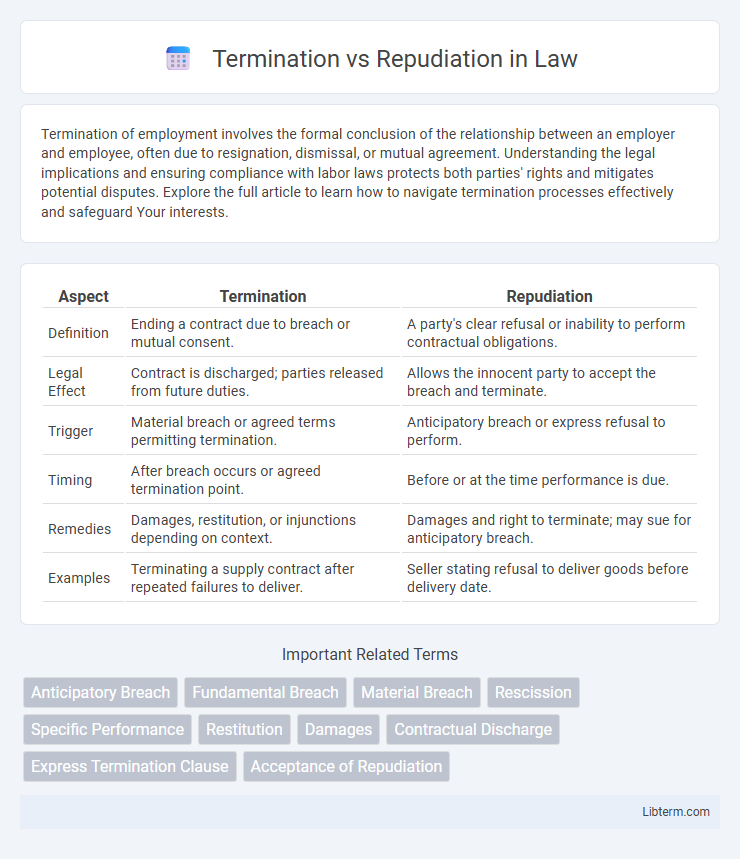Termination of employment involves the formal conclusion of the relationship between an employer and employee, often due to resignation, dismissal, or mutual agreement. Understanding the legal implications and ensuring compliance with labor laws protects both parties' rights and mitigates potential disputes. Explore the full article to learn how to navigate termination processes effectively and safeguard Your interests.
Table of Comparison
| Aspect | Termination | Repudiation |
|---|---|---|
| Definition | Ending a contract due to breach or mutual consent. | A party's clear refusal or inability to perform contractual obligations. |
| Legal Effect | Contract is discharged; parties released from future duties. | Allows the innocent party to accept the breach and terminate. |
| Trigger | Material breach or agreed terms permitting termination. | Anticipatory breach or express refusal to perform. |
| Timing | After breach occurs or agreed termination point. | Before or at the time performance is due. |
| Remedies | Damages, restitution, or injunctions depending on context. | Damages and right to terminate; may sue for anticipatory breach. |
| Examples | Terminating a supply contract after repeated failures to deliver. | Seller stating refusal to deliver goods before delivery date. |
Understanding Termination and Repudiation
Termination ends a contract legally, allowing parties to cease obligations due to completion or agreement, while repudiation occurs when one party indicates an intention to breach the contract, undermining its validity. Understanding termination involves recognizing lawful grounds such as performance, mutual consent, or frustration, whereas repudiation requires identifying clear conduct or statements that demonstrate unwillingness or inability to perform contractual duties. Properly distinguishing between these concepts is essential for enforcing rights and remedies in contract law.
Key Legal Definitions
Termination refers to the formal ending of a contract according to its terms, often triggered by mutual consent or the fulfillment of contractual obligations. Repudiation occurs when one party demonstrates an unequivocal refusal or inability to perform their contractual duties, allowing the non-breaching party to treat the contract as terminated. Key legal definitions emphasize that termination is an agreed or lawful conclusion, while repudiation constitutes a fundamental breach entitling the innocent party to terminate and seek damages.
Fundamental Differences Between Termination and Repudiation
Termination ends a contract with no further obligations, often due to performance completion or mutual consent, while repudiation occurs when one party refuses to fulfill contractual duties, breaching the agreement. Termination is a lawful conclusion of the contract, whereas repudiation signals a breach that entitles the innocent party to remedies, such as damages or termination. Understanding this distinction is critical in contract law for determining rights and remedies when agreements fail.
Common Causes for Termination
Common causes for termination in contracts include breach of essential terms, failure to perform obligations within agreed timelines, and mutual agreement between parties. Termination often results from non-compliance with specific contractual provisions or external factors such as insolvency or force majeure events. Unlike repudiation, termination is a formal conclusion of the contract recognized by law, preventing further obligations.
Circumstances Leading to Repudiation
Repudiation occurs when one party demonstrates an unequivocal intention not to perform their contractual obligations, often through explicit statements or conduct inconsistent with the contract terms. Key circumstances leading to repudiation include anticipatory breach, refusal to perform essential duties, or actions that fundamentally undermine the contract's purpose. These behaviors enable the non-breaching party to treat the contract as terminated and seek remedies for breach.
Legal Consequences of Termination
Termination of a contract legally ends the parties' obligations and releases them from future performance, often triggered by a breach or mutual agreement. The terminating party may seek damages for losses incurred, but the contract ceases to bind either side moving forward. Courts enforce termination rights strictly, ensuring the non-breaching party is protected while preserving remedies available for prior breaches.
Legal Consequences of Repudiation
Repudiation in contract law occurs when one party clearly indicates an intention not to fulfill their contractual obligations, leading to a breach. The legal consequences of repudiation allow the non-breaching party to either accept the repudiation and terminate the contract or affirm the contract and seek damages for breach. Courts may award damages to compensate for losses incurred due to repudiation, emphasizing the protection of contractual rights and remedies.
Rights and Remedies for the Aggrieved Party
Termination allows the aggrieved party to end the contract and seek damages for losses resulting from the breach, preserving accrued rights but discharging future obligations. Repudiation occurs when one party clearly indicates an intention not to perform, entitling the non-breaching party to accept the repudiation, terminate the contract, and claim damages immediately. Remedies under both include claiming compensatory damages, but repudiation also permits anticipatory action before actual breach, safeguarding the aggrieved party's interests.
Case Law Examples: Termination vs Repudiation
In contract law, termination and repudiation differ significantly in legal outcomes, illustrated by case law such as Hochster v De la Tour (1853), where anticipatory repudiation allowed the non-breaching party to terminate and claim damages before the breach occurred. Another leading case, White & Carter (Councils) Ltd v McGregor (1962), confirmed that a party may affirm the contract despite repudiation but can still seek damages, emphasizing the distinction between acceptance of breach and termination. These cases highlight that termination discharges contractual duties, while repudiation constitutes a breach that may be accepted or affirmed depending on the injured party's election.
Best Practices for Managing Contract Disputes
Effective management of contract disputes requires distinguishing between termination and repudiation to implement appropriate legal remedies. Termination involves legally ending the contract due to specific breach conditions, while repudiation occurs when one party indicates an unwillingness to perform their obligations, permitting the innocent party to accept the breach and seek damages. Best practices include documenting all communications, seeking legal advice promptly, and considering alternative dispute resolution methods to minimize litigation costs and preserve business relationships.
Termination Infographic

 libterm.com
libterm.com